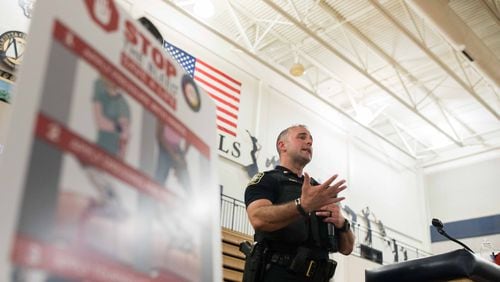As thousands of students and others descend on Atlanta, the nation’s capital and other US cities Saturday to demand changes to prevent mass school shootings, those who disagree with their solutions are working on their own measures to make campuses safer.
Some students are lobbying Georgia lawmakers for legislation that would allow teachers to carry firearms in the classroom. Others are holding safety workshops. A few groups, such as Students for Concealed Carry, are using social media to share information they say doesn't make the news that they hope may enlighten gun-control activists.
Some planned to watch Saturday’s demonstrations to learn what gun-control leaders have in mind. Others said they had no interest.
Luke Crawford, 24, director of the Georgia chapter of Students for Concealed Carry, said he's had discussions with some state lawmakers since last month's school shooting in Florida about allowing qualified teachers to arm themselves. Crawford said the approach should be considered, since hiring more school police could be expensive. Some lawmakers are receptive to the idea, he said, but any legislation may not come until next year since the current state legislative session ends this week.
“As wonderful as our law enforcement is, they can’t be everywhere,” said Crawford, who’s currently taking online classes from Thomas Edison State University in New Jersey.
University of Georgia political science major Erin Cooke, 19, largely echoed that viewpoint. As chapter president of Turning Point USA, a nonprofit that supports limited government, Cooke said she can't lobby lawmakers. Her approach is different. Her group holds weekly meetings on campus to educate classmates on gun issues and the Second Amendment.
“I believe the Second Amendment is important to self-defense,” she said.
Some students are exploring how they can better protect themselves. The Georgia Tech Marksmanship Club held active-shooter training late last week with campus police.
Robert Eagar, 26, was headed to that training from South Carolina. Eager, a student at the University of South Carolina School of Medicine in Greenville, is the southeastern regional director of Students for Concealed Carry. The group has shared information and statistics about guns on its Facebook page, hoping the data will strengthen the resolve of supporters and sway gun-control activists.
“The important part is to look at the numbers,” said Eagar, who started Georgia Tech’s Students for Concealed Carry chapter as an undergraduate student.
Second Amendment advocates say — citing various research — there are several million assault rifles in America, and nearly all owners use them within the law.
"It's not the AR-15 (the type of weapon used in several mass shootings), it's the person who's behind it," said Jerry Henry, executive director of Georgia Carry, one of the state's most prominent gun-rights groups.
Federal regulations prohibit the Bureau of Alcohol, Tobacco, Firearms and Explosives from collecting data on AR-15s.
Gun-rights leaders and Second Amendment advocates like Eagar believe instead of new gun-control measures, more must be done to enforce current laws to prevent access to firearms by those who should not have them.
The Heritage Foundation held a two-day school safety teach-in on gun issues at its Washington headquarters. Ideas discussed included more armed campus police, ensuring people diagnosed as mentally ill do not have access to guns, and exploring the impact of popular culture on gun violence.
“We’re trying to focus on the issues that really play a role,” said Tommy Binion, who grew up in metro Atlanta and is the foundation’s executive director of congressional and executive relations.
A red line for some is any law that would restrict access to guns.
“My question is if you are willing to give up a part or the whole Second Amendment, what else are you willing to give up?,” Henry asked. “We don’t want to give up any part of it because that’s what this country is founded on.”
Gun-rights supporters interviewed said they were unaware of any planned counter demonstrations Saturday. Crawford said they’ve learned they get more done through sit-downs with lawmakers than sit-ins and mass protests. Many, like Cooke and Crawford, also frequently talk to students who disagree with their viewpoints.
“I value everyone’s position, even if it doesn’t agree with mine,” Crawford said.
About the Author







